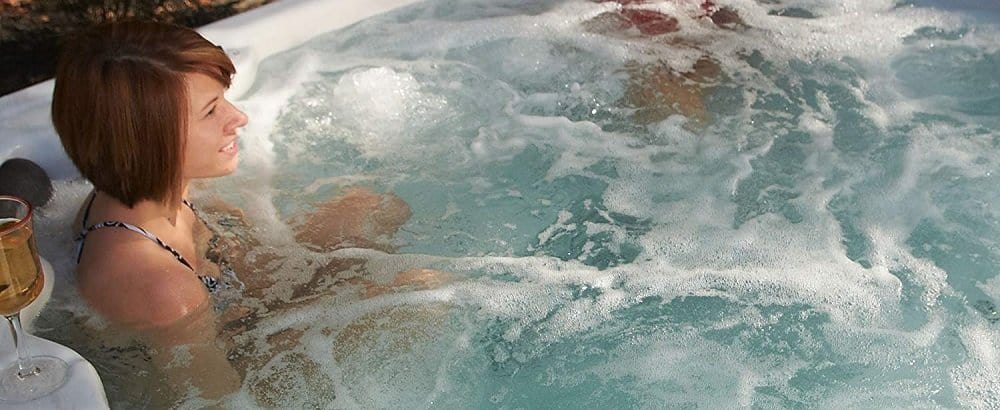Is soft water bad for hot tubs?
Soft water is bad for your hot tub. It can lead to corrosion of hot tub components. Keeping the calcium hardness in a safe range can also prevent an excess of foam on hot tub water. The optimum level of calcium to avoid this problem is 180-200ppm, but it depends upon your location and how hard or soft tap water comes out!
Stop wasting time and money with hot tub maintenance and confusing water chemistry! The Hot Tub Handbook and Video Course will help keep your hot tub balanced, sanitized, and crystal clear all the time.
Check out my list of high-quality hot tub products to help keep your hot tub clean and running great all year long!
My recommended product to help you test your hot tub or pool water for accurate pH, alkalinity, bromine, and chlorine readings is the AquaCheck Trutest Digital Reader.
Where I live, the calcium levels in the tap water are quite high. This can cause problems with hot tubs as well.
In this article, I will discuss more soft and hard water in relation to hot tubs.
Let’s get started!
Is it Ok To Use Soft Water In A Hot Tub?
Soft water is bad for your hot tub. The best type of water to use in a spa is neither too soft nor too hard, with an ideal calcium hardness between 180ppm and 200 ppm (parts per million).
If the water has a basic pH, then it is usually safe to use in a hot tub. However, if the water is too soft or has a high pH, it can cause problems with the filtration system and create an excess of foam.
Soft water does not have many minerals to deposit, but it usually leaves behind an environment with too few minerals along with a higher pH level. This can affect your hot tub’s water chemistry by preventing the spa from achieving the ideal pH and calcium hardness for maximum performance and efficiency.
To solve this you will need to inject pool salt into your system to raise the mineral content and reduce the pH level which will then stabilize your chemical balance over time.
What Is Soft Water?
Water is considered soft when it has low mineral content. Water from a municipal source, such as tap water, is classified as soft water. Soft water usually comes from frequent rainfall in areas near the ocean and few mountains in the area.
There are 2 different classifications of water hardness: hard, and soft.
Hard water contains a lot of minerals that the body needs to take care of these minerals. However, this can be bad for your dishwasher or washing machine because they need to use more soap to get rid of all the minerals.
The most common problems with soft-water hot tubs are corrosion and foaming tendencies (which will result in shiny patches).
To avoid these pitfalls you should make sure that the water in which it’s being used has been increased by at least 180 parts per million (ppm) by adding calcium hardness increaser tablets or powder.

Stop wasting time and money with hot tub maintenance and confusing water chemistry! Get Instant access to this easy-to-use book and video course so you can spend less time cleaning and more time soaking.
Learn MoreShould You Fill a Hot Tub With Hard or Soft Water?
I would recommend using hard water. While soft water does not have many minerals to deposit, it usually leaves behind an environment with too few minerals along with a higher pH level. This can affect your hot tub’s water chemistry by preventing the spa from achieving the ideal pH and calcium hardness for maximum performance and efficiency.
Hard water in a hot tub is not ideal either. The minerals in hard water can cause the same problems as soft water, such as clogging the filtration system and creating an excess of foam. In addition, hard water can also cause corrosion and tarnishing on the hot tub’s surface.
Is Hard Water Bad For hot Tubs?
Hard water is bad for hot tubs because it can leave scale residue on the shell and equipment, reducing the flow rate. It also makes cloudy spa waters that are not only unsightly but uncomfortable to be in due to high mineral content.
Hard water is the complete opposite of soft water. It is classified as water that has high mineral content. A common example of hard water is rainwater. Hard water typically contains high levels of calcium and magnesium carbonate.
Water with a high mineral content can be damaging to appliances, such as hot tubs. It can also cause scale build-up on fixtures and pipes. In addition, hard water can make it difficult to achieve the desired pH and calcium hardness levels in a spa.
It’s important to keep your pH and alkalinity balanced so that calcium can do its job well.
How Do You Soften Hard Water in a Hot Tub?
Adding fresh water and a scale control product will help keep the calcium level where you want it to be. Add this weekly if necessary, but follow instructions on how much of each package is required for your specific hot tub model.
If the calcium level is over 250 ppm, you should completely drain and clean your hot tub. When filling it up again using a hose filter to keep some minerals from entering water that goes into the spa as well as scale control products for balance purposes.
How Do You Harden Soft Water in a Hot Tub?
The easiest way to raise the hardness of your hot tub’s water is by adding calcium chloride, which comes in a form designed for use with spas. Add it at regular intervals and follow instructions on how much should be added.
Calcium chloride is an important mineral for soft water hot tubs. It helps to prevent corrosion and scale build-up, and also contributes to the overall hardness of the water.
Can I Put Water Softener Salt In My Hot Tub?
Adding salt to the water will not change the calcium hardness of the water. Softener salt can actually damage your hot tub in different ways since it’s not designed for hot tubs. When filling your hot tub with water that has been softened (less calcium), it’s important to harden the supply first using calcium treatments so there are no problems.
Softener salt is not a good idea for hot tubs because softener salt does not have the same properties as water softeners. It could make your hot tub corrode and scale-up which will ruin the look of your hot tub. Extra softening water doesn’t need to come from softener salt, it can easily be done by adding calcium hardness increaser tablets or powder.
How To Test Calcium in a Hot Tub
You have three options for testing the water in your hot tub: test strips, liquid tests, and professional analysis.
If you are looking for a quick and easy method then test strips may be best as they can detect levels of total hardness or calcium PPM with little effort on behalf of their use.
For those wishing to perform an accurate analysis that requires liquid samples.
I recommend these water test strips from JNW Direct Pool and Spa to test your water.
Consider Using a Water Care Monitor
Monitoring the health of your hot tub can often be challenging if you are not testing the water on a regular basis. This can also be a problem if you go on holiday or you are unable to take care of your hot tub due to mobility issues.
A test system I highly recommend is the Exact Industrial Test System. This system is great for hot tubs and pools and gives your a highly accurate digital readout of your water chemistry compared to other methods.
The pHin Smart Water Care Monitor for pools, hot tubs, and inflatable spas continuously tests the water and alerts you when to add chemicals with the integrated mobile app.
This water care monitor also takes constant readings of the temperature inside your hot tub. This will give you peace of mind while away from your spa.
The mobile app will inform you when to add chemicals such as chlorine, and how much chemical is recommended. This is done by entering your hot tub or pool’s unique dimensions.
Simply scan the bar code of any chemical brand and the pHin app will calculate how much chemical is to be added to the water. Most products and brands are recognized by the application.
The pHin device will sample water more than 1000 times per week to give you an accurate reading compared to using test strips.
The pHin device works with different water types including chlorine, bromine, and saltwater hot tubs, swim spas, inflatable hot tubs, and pools.
This unique device comes with a lifetime warranty to ensure your water remains clear and ready for you to use at all times.
How Do I Know Know How Hard My Water Is?
Testing soft water can be done with a specially designed strip. The color of each section will represent how soft the content really is and if they match what you expect then there should be no problems!
Testing water hardness is important to make sure the water is safe for use in a hot tub. You can use test strips, liquid tests, or professional analysis to test the water. It’s important to test the water regularly to make sure the pH and alkalinity levels are correct and that the calcium hardness is within the desired range.
You’ll want to test pH and alkalinity as well as calcium hardness. You can use liquid tests or professional analysis to do this.
White scale build-up can be very frustrating. You’ve probably got it around the jets, the fittings, the pipes, and anywhere else you can imagine.
One common cause of white scale build-up is soft water. This type of water is soft because it doesn’t have any hard minerals in it like calcium or magnesium that help to break down solids.
Once again, soft water is soft because it doesn’t have any hard minerals in it like calcium or magnesium that help to break down solids. The soft water will also create a lot of limescale when mixed with soap and air if the hot tub stays in use for an extended period.

Balancing Alkalinity in a Hot Tub
Alkalinity is a measure of all carbonates, including calcium and it determines the water’s ability to maintain pH stability. Fiberglass hot tubs are best balanced at between 170-250ppm alkaline concentrations. Once this level has been achieved then one can fine-tune their preferences for more acidic or basic waters by adding either an increaser (to increase) or reducer(decrease).
Alignment with the preferred acidity range will ensure your spa stays healthy year-round!
Alkalinity is important because it measures the water’s ability to maintain pH stability. If you have soft water, then you will need to adjust your levels of alkalinity in order to keep the water safe for use in a hot tub.
Alkalinity can be reduced by adding reducers or increased by adding increasers. Using soft water with an alkaline level that is too high can create limescale on pipes, fittings, and jets.
To handle multiple chemical imbalances in your hot tub, I recommend SpaGuard products for pH, alkalinity, and calcium control.
Too Much Calcium in a Hot Tub
If your calcium is over 250 PPM then drain some of the water from the hot tub, add fresh water with a scale control product to maintain calcium level where it should be. Add weekly if necessary but always follow manufacturer’s instructions for use
For calcium scale reduction I recommend this hot tub scale remover.
If you live in an area with hard water, then it’s no surprise to see scaling on your shower head and faucets. And if calcium levels get too high for the spa the hot tub scale will form quickly!
You’ll be able to see some of it on the jets, in a filter, and even nooks and crannies within your shell. But what’s more dangerous is scaling you don’t notice-the buildup from excess calcium can cause pumps seizing up or pipes being impeded with too many buildups that affect pH balance throwing off everything else about hot tub chemistry including alkalinity levels!
Is Rain Water Hard or Soft?
Most rainwater is soft because it doesn’t have any minerals in it like calcium or magnesium. This can be a problem for hot tubs because soft water will create a lot of limescale when mixed with soap and air if the hot tub stays in use for an extended period.
As rainwater falls, it is naturally soft. However, as the water makes its way through cracks in our earth and picks up minerals like chalk (which can make your foundation look a little less than brilliant), lime from construction sites or roads which contains mostly calcium magnesium carbonate together with other trace elements including sodium chloride bicarbonates.
This chemical formula leads to hard water.
Is Soft Water Bad For Hot Tubs: Conclusion

In this article, I covered that soft water is not great for your hot tub, neither is hard water.
Soft water can lead to corrosion of hot tub components, hard water can lead to scale buildup.
Soft and hard water is defined by calcium measured by PPM (parts per million).
Rain is usually made up of soft water until it hits the ground and mixes with elements in the environment.
In order to test calcium, use test strips or liquid test kits to get accurate results.
I hope you found this article on soft water being bad for your hot tub helpful.
Thanks for visiting spatoolkit.com
James Brockbank

Stop wasting time and money with hot tub maintenance and confusing water chemistry! Get Instant access to this easy-to-use book and video course so you can spend less time cleaning and more time soaking.
Learn More







